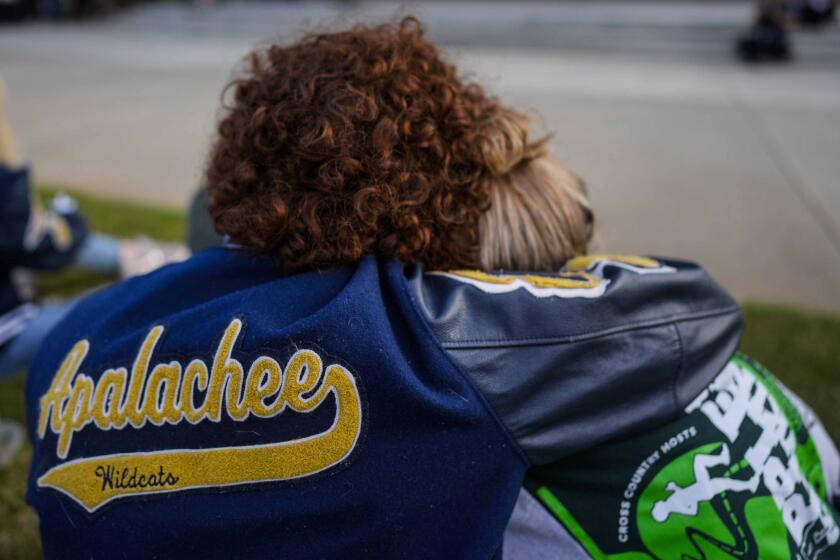‘Old American Soldier’ of Korean War Finds Good Life in China
JINAN, China — The Chinese captured James George Veneris in Korea on a starry night in 1950, and the American chose not to go home after the war. Even though he suffered in the Cultural Revolution, Veneris is glad he stayed.
Red Guards accused him of counterrevolution in the 1960s and he was forced to work as a rag picker, but life got better when President Richard M. Nixon visited China in 1972 and decades of hatred between the United States and China began to end.
“You see, I just did what Nixon did, that’s all,” he said. “Only I did it 22 years earlier. The folks in America don’t recognize this, but one day they’ll come around.”
Visited U.S. in 1976
The “old American soldier,” as the Chinese call him, visited the United States in 1976. He found himself a misfit and returned to China, where he will celebrate his 67th birthday March 30.
“I’m living the life of Riley here,” he said. “I’m still studying Chinese characters, three a day. I’ve got life knocked up. I want to live to 120.”
Twenty-two American prisoners of war and one Briton chose to live in China after the Korean War ended in 1953. Only Veneris and Howard Adams, another American, remain; one of the others died of a heart ailment in 1954 and the rest have left China.
Veneris, the son of a coal miner, was raised in Vandergrift, Pa. He is a gentle person with a shock of gray hair, a firm handshake and a slight heart condition that once again has put him under a doctor’s care.
He is a man in a time warp whose conversation is sprinkled with expressions from Maoist dogma and an America of half a century ago.
“Oh, I got some bananas, I got some bananas,” Veneris sang during a recent interview from his hospital bed. Then he dug into a bedside cupboard and pulled out several pieces of the fruit. “Just wish I had the rest of the makings for a good banana split,” he said.
When he and the others chose to live in China, they were branded defectors in the West and given dishonorable discharges. China hailed them as “peace fighters” and the fledgling communist government used them as propaganda.
Veneris fought in the Pacific during World War II and joined up again to stop communism in Korea.
“Heck, I believed Red China was going to invade California,” he said, but three years in a POW camp in North Korea ended the hatred.
“No, they didn’t brainwash me. That’s a bunch of baloney,” he said, poking with a finger to press his point. “I saw they were good people. They didn’t hate us, they only hated the people in Washington.”
On Nov. 28, 1950, Veneris had been in Korea just 27 days and was at the end of a retreating convoy.
“I remember the day real well,” he said. “It was in the evening. We were retreating. Suddenly everything stopped. Then came the Chinese bugles. All I could see was a quarter moon and the twinkling stars. Next day, we were surrounded.”
The 23 prisoners who went to China were given the choice of studying, working in a factory or the countryside, or doing nothing on a small monthly stipend.
“I took the factory and never regretted it,” Veneris said.
He was sent to Jinan in eastern China, where he worked at a paper mill as a lathe operator, blacksmith and machine repairman.
In 1956, he met a Chinese woman who would become the first of three wives. She died a few years later of tuberculosis.
During the early 1960s, he studied at the People’s University in Beijing and wrote a thesis on “How Good the People Are.”
“And that’s in capital letters,” he said. “It’s just about good people.”
Mao Tse-tung’s radical Cultural Revolution began and, as a foreigner, Veneris was suspected of counterrevolution.
He returned to Jinan and was forced to do hard labor.
“I pulled around a cart and picked rags,” he said. “I did a lot of sweating.”
His propaganda duties included a widely publicized speech against the Vietnam War. A second marriage ended because Veneris was a foreigner and old friends stayed away.
After the improvement in U.S.-Chinese relations, Veneris returned to the United States in 1976 for the Bicentennial.
“I spent a year there and must have slept in 300 homes,” he said. “I spoke 700 times on China. I did my internationalist duty.”
America had become a strange place to the exile.
“All those new gadgets: refrigerators that made ice, phones with buttons on them, video things,” he said. “I figured I might as well come back to China. I knew it better.”
He went to the United States again in 1984 to see sisters in California. The only things he says he misses now are “strong, non-filter cigarettes and good ice cream.”
After retiring from his factory job, Veneris began teaching English at the university. He spends his free time with his third wife, a professor of botany, and two children from his second marriage.
His daughter, 18, sells tickets on the No. 35 bus in Jinan but his 16-year-old son “doesn’t do much of anything except play,” he said.
Blowing out a cloud of cigarette smoke, the “old American soldier” lay back on the pillows and quoted Chairman Mao: “The road is tortuous but the future is bright.”
Then he grinned and said: “Now ain’t that the cat’s meow?”
More to Read
Sign up for Essential California
The most important California stories and recommendations in your inbox every morning.
You may occasionally receive promotional content from the Los Angeles Times.










